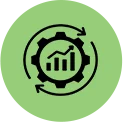Sales Funnel
How to Start a Sales Funnel: A Complete Guide for Beginners
In today’s competitive digital landscape, businesses need more than just a great product or service to succeed. The secret behind most thriving businesses lies in their ability to guide customers smoothly from discovery to purchase — and that’s exactly what a sales funnel does. If you have ever wondered how to start a sales funnel for your business, this guide will walk you through the process in a clear, practical way. Whether you’re running a small online store, a service business, or a growing e-commerce brand, understanding and building your own funnel can transform the way you attract and convert customers.


Understanding What a Sales Funnel Really Is
A sales funnel is simply a journey that your potential customers go through before they make a purchase. Picture it as an actual funnel: wide at the top and narrow at the bottom. At the top, you have people who are just discovering your business, maybe through a social media post, ad, or blog article. As they move down the funnel, they learn more about what you offer, engage with your content, and finally make a buying decision.
The funnel typically has multiple stages — awareness, interest, decision, and action — but don’t worry, you don’t have to overcomplicate it. The key is to create a system that consistently takes strangers from “I’ve never heard of this brand” to “Yes, I want to buy this product!”
Laying the Groundwork for Your Sales Funnel
Before you start building your funnel, you need a clear understanding of your audience. Who are they? What problems are they trying to solve? What motivates them to take action? These questions help you design a funnel that actually works rather than a generic one that fails to convert.
The next step is to make sure you have a strong offer. Your offer is not just your product — it’s the complete package that includes the value you provide, how you present it, and what makes it stand out. A well-defined offer is the backbone of a successful funnel.


Driving Traffic into Your Funnel
Once you know your audience and offer, you need to drive people into your funnel. This is the “top of the funnel” where awareness happens. There are many ways to attract traffic — social media marketing, search engine optimization (SEO), paid advertising, email marketing, and even influencer collaborations. The key here is consistency. You want to keep bringing new people into the funnel so that you always have prospects moving toward a purchase.
Good content plays a big role here. Whether it’s educational blogs, short videos, or social media posts, create material that answers your audience’s questions and sparks their interest. This positions your brand as a trustworthy solution provider.

Engaging Your Audience and Building Trust
Getting visitors to your site or landing page is just the first step. Your funnel should be designed to engage them and keep them interested. One of the most effective ways to do this is by using lead magnets — free resources like eBooks, checklists, or webinars that provide value in exchange for their email address.
Once you have their contact details, nurture them with helpful emails, tips, and case studies. This step builds trust and moves them closer to the buying decision. Remember, people rarely buy the first time they hear about you, so engagement is crucial.

Guiding Prospects Toward the Purchase
The bottom of the funnel is where conversions happen. This is where you present your product or service as the ultimate solution to their problem. You want to make it as easy as possible for them to take the next step — whether that’s making a purchase, booking a call, or signing up for a free trial.
You should also think about retargeting. Many prospects will visit your site and leave without buying. Retargeting ads on social media or Google can bring them back and increase your chances of conversion.

Measuring and Optimizing Your Funnel
A sales funnel is not something you set up once and forget. To get the best results, you need to measure how it’s performing and optimize along the way. Keep an eye on metrics like click-through rates, conversion rates, and customer acquisition costs. Small tweaks — like improving your headline, adding a testimonial, or simplifying your checkout process — can lead to big improvements in results. The most successful businesses are those that continuously test and refine their funnels.

our Next Step Toward Building a Profitable Funnel
Many beginners think they need expensive software or complex automation to start a sales funnel. While tools can make things easier, the most important thing is to start simple.
Even a basic funnel — a landing page, an email follow-up, and a checkout process — can start generating results.
As your business grows, you can add more advanced features like upsells, A/B testing, and automation.
Contact Information



